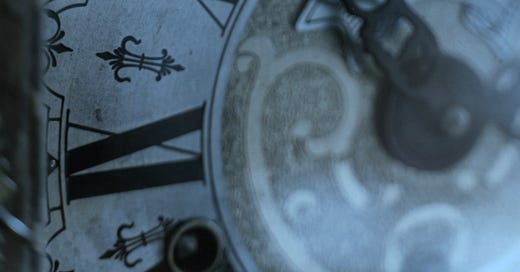Winter came with nothing and took everything. That was its way. But year after year, Julia Nielsen, wrapped in baby-blue satins and flowered brocades, refused its entry. That was her way.
She wouldn’t allow clocks in the house. The only one was Randolph Nielsen’s pocket watch, and that was locked in the bedroom bureau. There were no calendars. Julia wouldn’t have them. With enough firewood, flowers, and pastel drapery, the cold—if not the bills—could be imagined away. In the Nielsen house, it was only ever summer.
Winter bided its time.
The change of the seasons began with a vase. Julia stared. It was the original, and not the original. Like it in color and gold filigree, but where the old wound around and up into a jade blossom, the new wilted into a bare stamen, a single ceramic petal withered and holding on by a thread.
It was the servants’ day off, and Randolph was out on business. No one was playing a joke. She was alone in the house.
Picking up the fallen petals, Julia stashed them in a pocket and fled to find the paste.
In the hall, a chair boasted dark urn-print brocade, where before it blushed curlicue pink satin. The fresh flowers were gone. In their place, bare branches stretched towards the wall.
Grabbing the branches, Julia ran back to the parlor and tossed them into the fire. Snatching a blanket from the divan, she hurried back to the hall and threw it over the dark upholstery.
The house smelled of snow and damp wood.
She could believe that time had worn away the roof, that the elements were creeping into her home, ice consuming board and hinge.
Winter was blowing through the house. Sometimes ahead of her. Sometimes just behind.
Dashing to a side table, she wailed, running her hands over the china figures. Shepherds and shepherdesses bent into elderly forms. Glass musicians mourned instead of smiling. Porcelain children fell into piles of dust.
On the staircase wall, paintings of the natural world, faces and bodies in portraits, peeled and flaked, snowing down from their frames.
The stairs before her contorted. Boards shrank and rotted, clumping off and falling into pulp. Ascending, she clung to the banister, dreading every step.
Flinging open the bedroom door, she rushed into the room. The morning’s roses on her vanity fell dead, crunching under her feet. A tarnished silver brush and broken pedestal mirror took up what space there was on the table’s surface.
Her fingers skimmed the glass, cracked like a spider’s web, distorting her image. Since the change began, it was the only mirror she’d seen. Winter had taken them. All but this one.
She’d sat before it, riffling through the day’s preparations without a thought to the present. Grocery bills, planning a dinner for their friends, whether to invite the new neighbors. She’d thought of all of it as she brushed her hair, but she had no memory of her face as it looked that morning.
Slumping down at the vanity table, Julia dropped her head into her arms.
Below, in the parlor, the high-backed chair closest to the fire popped and creaked.
Someone was sitting there.
Somewhere in the house, a clock struck three.
Passing into the hall, she closed the door, hearing the chamber shift in tone, echo, and depth as she sealed it shut.
Reaching the bottom of the stairs, she froze.
The parlor door hung open. Someone waited within, attending to her, keeping still.
Sliding along the passage, she peered through the open door. A shadow of fog and ice stood against the far wall. The shape was Julia’s and not Julia’s. Her hair, her form, her profile, but all fallen, running down. It shivered, waiting beside the empty fireplace.
A sob cracked her throat.
Winter turned from the mantle to look at her.
Julia closed her eyes and thought of the moment before the vase, holding the memory of herself as she had been.
Winter gusted over the rug and into the hall, coming to rest before her. Its eyes moved to her pocket.
Julia reached in and drew out the ceramic petals.
The shadow held out its hand.
Wrapping her fingers around the jade pieces, Julia extended her arm, resting her fist in the outstretched palm.
The grip closed, crunching and drifting like snow, circling her wrist.
The weight of the petals ached the joints of her hands. She didn’t try to hold on.
Julia exhaled, trembling.
Winter raised its other hand, frost fingertips brushing her cheek. She straightened to face the eyes staring into hers, full of pity. The shadow shook its head, reminding Julia of her governess disapproving of her inattention at lessons.
Its lips parted, blowing the loose strands on her forehead and swirling the air into a cloud of sleet.
When the wind died down, it was gone.
Julia stood alone in the entry hall, white hair falling across her face, both herself and someone else.
Through a hole in the ceiling, a bird swooped and perched in the entryway beside her. She watched the little creature, not remembering when she’d last seen a chickadee that wasn’t made of glass.
The bird chirped, beginning a call, his feet gripping the curling wooden ornamentation of a ticking grandfather clock.
If you liked this story…
Feedback on this story was provided by
of Labyrinth Editing.Photo by Tima Miroshnichenko: https://www.pexels.com/photo/close-up-photo-of-a-vintage-analog-clock-8327534/







What a gorgeous story, Jennifer. So evocative, with its delicate, detailed settings and the tender turn at the end. Loved it.
Gorgeous piece. I enjoyed it.